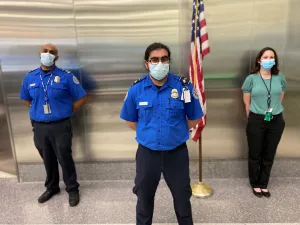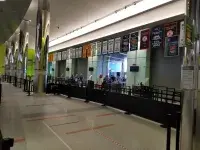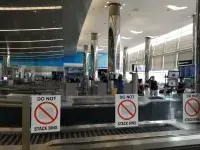
TSA officers are trained to screen airport passengers, bags and cargo for prohibited and dangerous items, but Boston Officer Melvin Castellano took his training to the next level. When Castellano saw something suspicious at Boston Logan International Airport’s C2 checkpoint, he quickly said something.
As a 26-year-old female passenger came through the checkpoint, Castellano noticed the woman had bruises and appeared to be controlled by her male companion. Castellano quickly but quietly notified supervisor Akeem Bahadoor.
“[Officer] Castellano approached me with concern for the possible safety of the passenger due to signs of struggle and possible injury,” said Bahadoor, who noted the woman also seemed to be intoxicated.
Bahadoor tried to talk with the woman, offering her medical attention, which she declined. Her male companion told Bahadoor the woman’s mother in Cambodia bought her daughter’s plane ticket. Suspicious, Bahadoor called TSA Manager Meaghan Verdone who agreed this could be a case of human trafficking.
“It was like going down a checklist of our training,” Verdone said. “Her male companion did most of the talking. They had repetitive answers that sounded rehearsed. She had bruises on her neck she was trying to hide with her clothing. She appeared to be under the influence. When we reviewed footage of the passengers at the ticket counter, you could see her stomp her feet and walk away from him. It was clear she did not want to go on the flight.”
Massachusetts State Police were called to the scene and interviewed both people, although the man did the talking. “There was no hesitation to call state police,” said Verdone. “We, as a team, quickly agreed we had a possible case. The next step was to report it to Massachusetts State Police and the TSA management team. Our job is to observe and report.”
The woman was quiet and stressed but calmed down and opened up while in a private room with a female trooper, saying she was very sad but wanted to stay in the U.S. with her companion because her abusive ex-husband is in Cambodia and her parents were making her return home.
Her companion said the two were engaged, and she didn’t speak English very well. She missed her flight but caught another flight the next day with her companion accompanying her to her gate.
Although this turned out not to be a case of human trafficking, both passengers understood why TSA called police, and the female passenger was happy TSA cared for her.
“Human trafficking is a serious problem; you never know who could be a victim,” said Verdone. “If this was a true human trafficking situation, [Officer Castellano] could have saved her life. He knew something wasn’t right, and he reported it. This proves our training works. If you see something, please say something.”
“I feel terrible that this could possibly be real life for anyone,” noted Bahadoor, “but proud of TSA’s reaction and how my staff and upper management went about it. We approached it with confidence and professionalism and fell back on our training to help lead us.”
Bahadoor offers a reminder that TSA’s role in combatting human trafficking is clearly outlined in the DHS Blue Campaign. “These little interventions could possibly save a life,” he said. “Officers should always discreetly report these and any concerns about anyone to the direct [supervisor] on duty. As a supervisor, it’s my job to make a knowledge- and experience-based decision.”
“Focus on the facts,” Verdone added. “What indicators did you observe? What were they wearing? Good reporting will help law enforcement and federal agencies investigate and hopefully save a life.”


